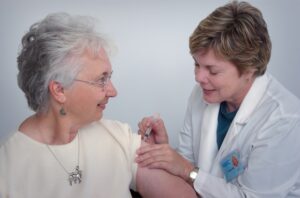Page Contents
The recent waves of COVID-19 have underscored the ongoing challenges faced by countries across the globe. As the virus continues to mutate and new variants emerge, the impact on populations, including the elderly, has been profound. Many countries have experienced surges in cases, straining healthcare systems and necessitating renewed public health efforts. The elderly, given their increased vulnerability, have borne a significant burden during these waves, facing higher rates of hospitalisation and mortality. The global community’s response, including vaccination campaigns and public health measures, has played a pivotal role in mitigating the impact. However, the recent challenges highlight the need for ongoing vigilance, adaptability in public health strategies, and global cooperation to protect the most vulnerable populations, particularly the elderly, from the continued threats posed by COVID-19.
Elderly people are the vulnerable population
Among those at higher risk, the elderly stand out as a vulnerable population. Individuals aged 65 and older, especially those with pre-existing health conditions, face an increased likelihood of developing severe symptoms if infected with the SARS-CoV-2 virus. As the global community battles the ongoing pandemic, understanding the unique challenges faced by the elderly is crucial in developing effective strategies for protection.

Why the elderly population are at higher risk?
Weakened immune system
As we all age, our immune system tends to be weaken, making it more challenging for the body to fight off infections. This weakened immune response can lead to a slower and less effective defense against the virus.Pre-existing health conditions
Older adults are more likely to have underlying health conditions such as heart disease, diabetes, respiratory issues, or compromised immune systems. COVID-19 can exacerbate these conditions, leading to more severe illness and complications.Higher risk of severe disease: Studies have consistently shown that older individuals, especially those over the age of 65, are at a higher risk of developing severe illness, requiring hospitalisation, and facing a higher mortality rate if they contract COVID-19.
Increased vulnerability to respiratory issues
COVID-19 primarily affects the respiratory system. Older adults may have a reduced lung capacity, making them more vulnerable to respiratory complications associated with the virus, such as pneumonia and acute respiratory distress syndrome (ARDS).Long-term care facilities
The virus can spread quickly in communal living settings, such as nursing homes and assisted living facilities, where a significant number of elderly individuals reside. Close living quarters and shared spaces make it challenging to prevent and control outbreaks.Delayed symptom onset
Older adults may not exhibit typical COVID-19 symptoms, such as fever and cough, as prominently as younger individuals. This delayed symptom onset can result in delayed medical intervention, increasing the risk of severe outcomes.Compromised response to inflammation
Ageing can affect the body’s ability to regulate inflammation. COVID-19 can trigger an inflammatory response known as a cytokine storm, which can be especially harmful in older individuals, leading to organ damage and failure.
Is vaccination still effective?
Vaccination has emerged as a crucial tool in mitigating the impact of COVID-19, especially among the elderly. Clinical trials and real-world data consistently demonstrate that COVID-19 vaccines are highly effective in preventing severe illness, hospitalisation, and death. By stimulating the immune system to recognise and combat the virus, vaccines provide a powerful defense against the severe consequences of COVID-19.
Booster doses, specifically designed to enhance and prolong vaccine efficacy, have been recommended for older adults to ensure sustained protection. Vaccination not only reduces the risk of severe illness in the elderly but also helps curb the overall transmission of the virus, contributing to community-wide protection.


How else the elderly can prevent COVID?
In addition to vaccination, several preventive measures can help protect the elderly from COVID-19. These include practicing good hand hygiene, maintaining physical distancing, wearing masks in crowded or high-risk settings, and avoiding large gatherings. Ensuring proper ventilation in indoor spaces can also reduce the risk of airborne transmission.
For older adults residing in communal living settings, such as nursing homes, strict infection control measures are paramount. Regular testing, quarantine protocols, and visitor restrictions are crucial steps in preventing outbreaks in these environments.
Conclusion
As the world continues its battle against the COVID-19 pandemic, recognising the elevated risks faced by the elderly is essential. Vaccination has proven to be a powerful ally in safeguarding this vulnerable population, but a comprehensive approach that includes preventive measures and community-wide efforts is necessary. By understanding and addressing the unique challenges faced by the elderly, we can work towards minimizing the impact of COVID-19 on this demographic and promoting the health and well-being of older individuals globally.
